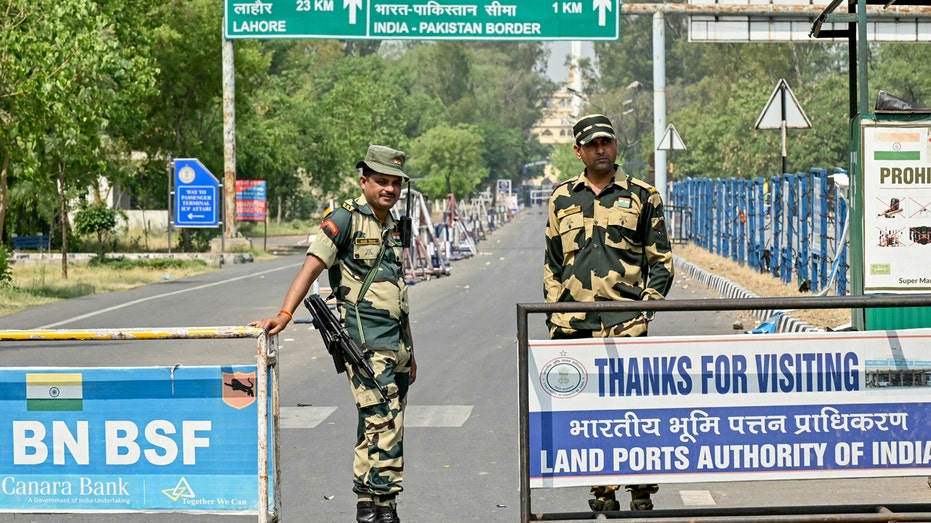Trumps 'Art of the Deal' diplomacy just delivered a global winwithout a shot fired
Something extraordinary happened on Friday, but you likely didnt see it in the headlines.In Washington, the International Monetary Fund (IMF) quietly approved a $2.3 billion bailout package for Pakistan. On the surface, it was just another financial deal. But beneath the surface, this vote tied together three of the most pressing foreign policy theaters in the world: India-Pakistan, Ukraine-Russia, and U.S.-China.INSIDE THE WHITE HOUSE'S EFFORT TO PULL INDIA, PAKISTAN BACK FROM THE BRINK OF WARAnd the common thread?President Trumps return to "Art of the Deal" diplomacy.The $2.3 billion IMF package included a $1 billion tranche under the Extended Fund Facility (EFF) and $1.3 billion under the Resilience and Sustainability Facility (RSF). But many experts were surprised this vote even happened, let alone passed.Just last year, Pakistans IMF bailout was contingent on its assistance in rearming NATO during the Ukraine war. The Biden administration leaned heavily on Pakistan to support weapons transfers, using routes like the Nur Khan Airbase to send munitions to Europe.This time around, the vote looked shaky. The Trump administration has made it clear it wants to end the war in Ukraineand all wars that bleed U.S. taxpayers without clear gain. Meanwhile, India was lobbying both the IMF and the Financial Action Task Force (FATF) to block funding to Pakistan, citing terrorism financing concerns.And then came the vote.India abstained. So did China and Russia. The "yes" votes came from the United States and the United Kingdom.If youre wondering why the U.S.under Trumps second termwould back a loan to a terror-linked state in the middle of a war, heres the answer: because the deal was far bigger than Pakistan.Lets unpack what likely happened.A Strategic Concession from India?Indias abstention puzzled many. It had taken a strong stand against the IMF loan, arguing that it violated basic principles of counter-terror financing. For India to let it slide signaled something else was in play.Trumps first major diplomatic focus post-inauguration was reworking Americas global trade deals, and India was high on the list. The president had long called India the "tariff king," and negotiations had been underway to reduce agricultural and industrial tariffs. In fact, Vice President JD Vance had been dispatched to New Delhinot a low-level envoy.There were signs a deal was close. But the momentum was disrupted by a major terrorist attack in Kashmir, which India blamed on Pakistan-based groups. The India-U.S. trade deal went into a holding pattern.Now, Indias IMF abstention appears less like inaction and more like a trade-off: a quiet concession, in return for favorable terms in the broader trade agreement with the U.S.Pakistans Clock Was TickingPakistan, for its part, was running on empty. It reportedly had only four days of ammunition left and faced near-total economic collapse. Though some NATO members had sent emergency aid, the U.S. itself has been moving to reduce entanglements with NATO and phase out military support in Ukraine.But heres where it gets more interesting.The United States has long had an internal debate over Pakistan. During the Cold War and the war on terror, some intelligence factions saw Pakistan as a necessary partnereven when it meant funding terror groups like the Mujahideen. In more recent years, others have shifted toward India as the natural counterweight to China.This division within U.S. security circles matters, because it means that the fight over Pakistan is both internal and external.And yet, the Trump administration pushed the vote through.Why?One likely condition: a ceasefire in the India-Pakistan conflict.But there may have been another conditionone that had Chinas fingerprints all over it.Why Did China Sit Out?If theres one country that stands to gain from Pakistans financial boost, its China.Pakistan is deeply indebted to China through Belt and Road infrastructure deals. And more to the point, most of its military imports come from Chinese manufacturers. Any fresh IMF cash would likely end up buying Chinese weapons.So why did China abstain from voting on Pakistans loan?Simple: Because Trump likely barred it.Sources close to the matter suggest that strict terms were placed on the loanstipulating that IMF funds cannot be spent on Chinese or Russian weapons systems, only American ones. That alone would have removed Chinas incentive to back the package.CLICK HERE FOR MORE FOX NEWS OPINIONAdd to that the increasing chatter over Chinese versus Western arms systems in the India-Pakistan conflictand Chinas abstention begins to make a lot of sense.One Vote. Three Wins.By pushing this IMF package forward under strict conditions, the Trump administration appears to have pulled off a remarkable maneuver:All in one vote.There were no headlines. No press briefings. No declarations of success.But thats often how real power operates.Critics may scoff at the idea that Trump is capable of high-level diplomacy. But for those tracking the architecture of global influencethis vote was not noise. It was signal.It was a reminder that American power, when wielded with strategic clarity, doesnt need to announce itself loudly.It just needs to move the board. Quietly. Completely. Effectively.And if you were watching this one closely, you saw just that.CLICK HERE FOR MORE FROM TANVI RATNA




